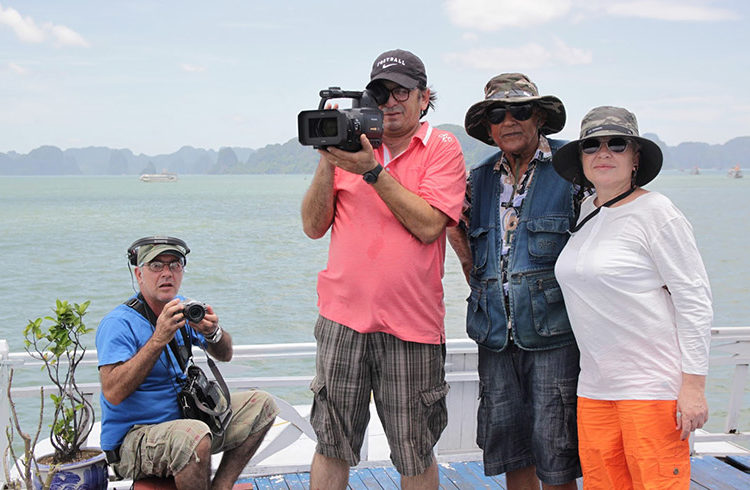This September cinema buffs will be able to enjoy several documentaries, two of them in homage of renowned figures of Cuban culture and others on traditions and foreign inheritances in Cuba.
Famous artist and producer Isabel Santos will screen her latest documentary Viaje al país que ya no existe, in homage to outstanding photography director Ivan Napoles, who used to be the eyes of Santiago Alvarez. The piece was produced by the Cuban Film Institute (ICAIC by its acronym in Spanish) and the Ministry of Information and Communications from the Socialist Republic of Vietnam. It lasts 42 minutes and was shot in that Asian nation where they travelled to along with Napoles 40 years after he had recorded the war and the reconstruction of this country. It is a chronicle about the return of his most intimate images. This reunion made him laugh and cry. Over the shackles of the past, there is a new nation, which is quite different in his memories. That’s the reason for the title, its producer told OnCuba, “because it is amazing and shocking that transformation this country has gone through (…) I was surprised with Vietnam today. It was an intense and passionate shooting where I found a really different nation than the one in the images broadcasted when I was little”, pointed out the main female character in the film Clandestinos.
Feijoó, locura de creación is the title of the latest documentary by producer Miguel Torres. It pays homage to multipurpose self-taught Cuban artist Samuel Feijoo. He is one of the most important figures in terms of research on farmers’ issues and he was an outstanding editor for the magazine Islas y Signos. In about 30 minutes the documentary deals with the life and work of this extraordinary writer, painter and collector of myths and legends from the central Cuban provinces. Miguel Torres directed ICAIC’s Latin American News, and made several broadcasts between 1972 and 1977. He led ICAIC’s Department of International Relations and produced about 20 documentaries that have been presented multiple awards.
Producer Gloria Rolando dealt with the topic of Cuban inheritances and traditions enriched by African immigrants. This successful producer of documentaries is one of the most active filmmakers in the field of documentaries, and has focused her work on the traditions of black Cuban communities. Her powerful speech is in accordance with the dignity of the characters she portraits in her pieces. This month she brings two documentaries Reembarque and Pasajes del corazón y la memoria. The first one lasts 58 minutes and includes the several prestigious historians whose researches add up to the memories of Haitians and their descendants in Cuba. The oldest still recall their families were victims of re-embarking. Therefore, she decided to pay this well-deserved homage to anonymous heroes that intertwined an important passage between two Caribbean peoples: Cuba and Haiti.
As a black woman and as an artist she has found inspiration in the apprehension of the Afro-American environment, the knowledge on its particular characteristics, and its agreements and disagreements. Her second documentary to be premiered soon lasts 36 minutes and is about migration processes among Caribbean islands and its cultural repercussion. It starts as a legend: “The oldest and those who cannot forget say that back in the 20’s and 30’s little ships used to come and go between the Isle of Youth and the Cayman Islands…” That was the beginning of a human bridge that gave birth to Cuban-Caymans families. The offspring of Caymans thus arrived in the Isle of Youth with new hopes in life. However, those excellent fishermen brought in the culture of coconuts. They brought along Caribbean rhythms and melodies which as exceptional patrimony are parte of the repertory by the Sonny Boy Band.










